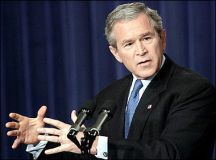Bush says concerned about Darfur genocide
WASHINGTON, June 1 (Reuters) – President Bush said on Wednesday he was concerned about genocide in Sudan’s troubled Darfur region but stopped short of offering military involvement beyond the logistical aid Washington now provides.
 “This is a serious situation,” Bush said during a meeting at the Oval Office with South African President Thabo Mbeki. “As you know, former Secretary of State Colin Powell, with my concurrence, declared the situation a genocide.”
“This is a serious situation,” Bush said during a meeting at the Oval Office with South African President Thabo Mbeki. “As you know, former Secretary of State Colin Powell, with my concurrence, declared the situation a genocide.”
The Bush administration, which is providing logistical aid through NATO to African Union troops, has been criticized for not doing enough to end the killings and atrocities.
Mbeki did not challenge Bush’s characterization of the Darfur crisis as genocide but steered clear of using the word himself at a later briefing with reporters.
“It might be fine for someone in the United States to be making all sorts of statements, but we have to work (on finding a solution),” Mbeki said. “We are looking for a solution to the problem and the solution, does it lie in making radical statements? Not for us as Africans. The solution lies in mobilizing (all parties),” he added.
Bush first used the word genocide to describe the Darfur crisis in September 2004 in a statement he issued.
The Darfur conflict broke out in February 2003 after rebels took up arms against the Arab-dominated government.
Sudan’s government is accused of retaliating by arming the local Arab militia, who burned down villages and slaughtered and raped civilians. Tens of thousands have been killed and more than 2 million have been forced to flee their homes.
U.S. Deputy Secretary of State Robert Zoellick this week is making his second trip in a month to Darfur.
Bush said the United States will be contributing a transport plane as part of a NATO effort to help the African Union troops.
Mbeki said the United States and other non-African countries were not being asked to deploy troops.
“Our view has been that it’s critically important that the African continent should deal with these conflict situations on the continent — and that includes Darfur,” Mbeki said.
The nonprofit International Crisis Group said the African Union forces may not be sufficient to address the scope of the problem in Darfur.
“Ideally, the gap would be filled by more African personnel with strong international support, but if this proves unworkable in the short time available, a multinational bridging force will be the only solution to tackle Darfur’s most urgent protection needs,” the group said in a statement.
Also in the meeting with Mbeki, Bush criticized Zimbabwe President Robert Mugabe’s handling of an economic crisis marked by fuel, food and currency shortages.
“We are concerned about a leadership that does not adhere to democratic principles, and, obviously, concerned about a country that was able to, for example, feed herself, now has to import food, as an example of the consequence of not adhering to democratic principles,” Bush said.
Mbeki has come under criticism from Zimbabwe’s opposition for his “quiet diplomacy” style in trying to resolve the Zimbabwe crisis.
He told reporters his government wants to help both the opposition party and ruling party in Zimbabwe find ways to solve the country’s political and economic problems.
“The critical challenge…is to assist the people of Zimbabwe to overcome their political problems, their economic problems,” Mbeki said.
“Clearly, one of the critically important things to do is to make sure that you have the political arrangements that address matters of rule of law, matters that address issues of the freedom of the press, issues that address questions of freedom of assembly,” he said.
